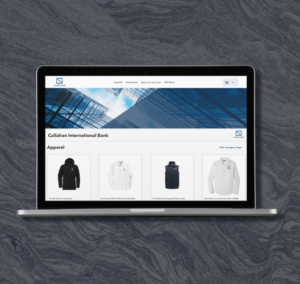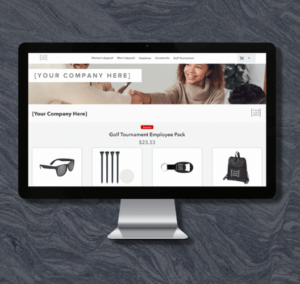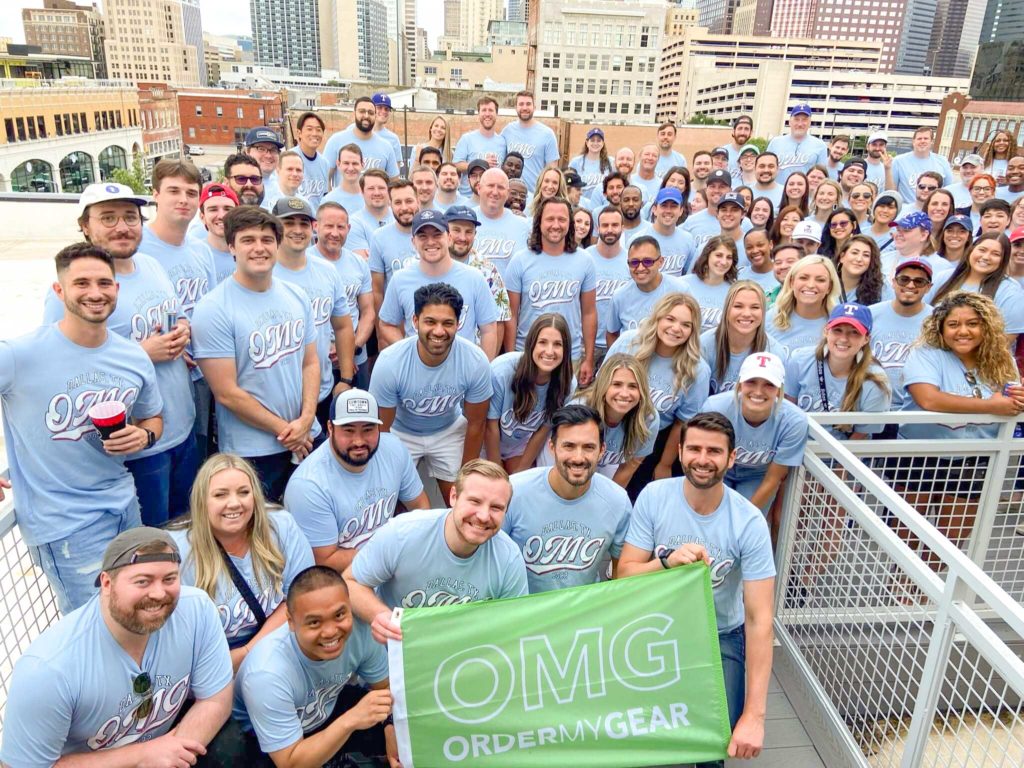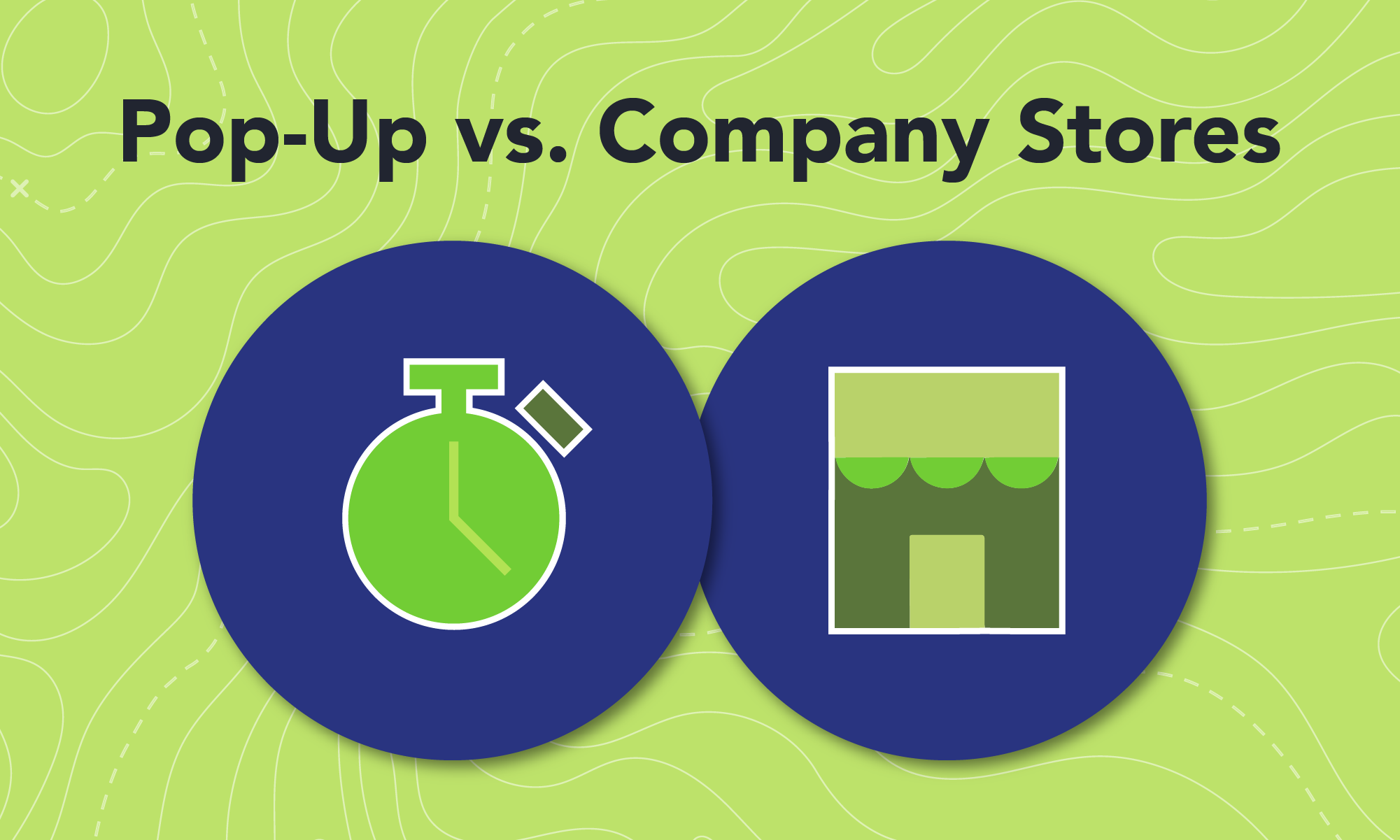The landscape of OrderMyGear’s online store solutions is diverse and always evolving. Let us be your guide and help you navigate which path will lead to the perfect fit!
From quick-launch Pop-Up Stores to fully customizable Company Stores, each offers a unique set of features designed to cater to specific business objectives, customer needs, and shopper experiences. Whether you’re brand new to OMG or simply want a refresher on our store types, it’s empowering to make informed decisions that will propel your business forward. Below, you’ll find more information on each store platform.
- Pop-Up Stores: Perfect for short-term programs, Pop-Up Stores enable the quick launch of limited-time-only stores with minimal setup time – typically around fifteen minutes! With no technical skills required, these stores cater to needs such as team uniforms, spirit wear, fundraisers, and holiday events, providing a swift and efficient solution for temporary retail needs.
- Redemption Stores: Built on the Pop-Up platform, this store type provides a hassle-free checkout experience where shoppers simply enter a code to redeem their desired products. Highly customizable, these stores allow for the distribution of unique codes to each recipient, enhancing privacy and security. Ideal for scenarios like employee recognition, corporate gifts, and exclusive promotions.
- Company Stores: Offering a fully branded retail experience, Company Stores provide a sleek and customized platform tailored to showcase a client’s brand. Configurable to meet branding specifications, these stores boast various templates and design tools, allowing for complete customization to match company colors and logos. Suitable for long-term programs, employee uniforms, company swag, and more.
Key Questions to Ask Your Customers
With OMG’s online stores, you may be questioning how to narrow it down and decide what’s really best for your customer. Gathering as much helpful information as you can is the perfect place to start, and we have compiled a list of discussion points that can help you choose between a Pop-Up Store, Redemption Store, or Company Store. Key questions to ask your customer include:
- What is the store’s purpose?
- How much branding and customization will the store need?
- What experience do you want the shopper to have?
- Will the store need user accounts?
- How will shoppers pay for the products?
- How will fulfillment be managed?
These questions can help you determine which store type will best suit your customer’s needs. For example, if your customer needs basic branding, then a Pop-Up Store will likely work well for them. However, if they require a storefront that accurately matches their website, your customer may be in need of a Company Store, where the customization options are abundant.
To view a full list of questions and topics that are important to discuss, you can find the Online Store Discovery Checklist on our website.
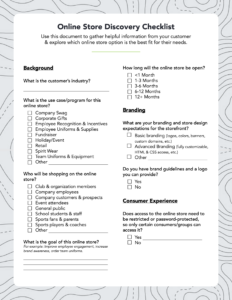
For a more detailed analysis, let’s break down each store type and their core differences.
Differences in Store Design
Starting off with store building and design differences, you’ll notice a contrast between the store build time, design options, and customization levels. Pop-Up and Redemption Stores are quick and easy to build, you can copy stores previously built, use a supplier built template, or save one of your own stores as a template to use for future stores. Company Stores, on the other hand, are fully customizable and have more design options so you can perfectly match your customer’s branding. While Pop-Up and Redemption Stores are great for a fast store launch, Company Stores may take longer due to the robust customization and design options. It’s important to note that both store types offer multi-page storefronts as well as custom domain options.
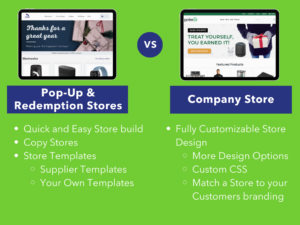
Checkout & Payment Differences
The next notable differences to cover are payments and checkout. With both platforms, payment options are extensive and include options to calculate sales tax and shipping, as well as pay with gift cards, credit cards, or coupons. The choice comes down to the specifics of what your customer wants to offer shoppers. This may include the option to show products in point value rather than a dollar amount, in which case it would be best to pitch a Company Store. Another example would be a customer wanting to distribute gifts or employee uniforms at no cost to the shopper. In this case, a Redemption Store is ideal since no payment is collected.
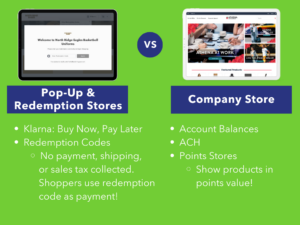
User Experience Differences
There are also certain features that are available only on the Company Store platform, such as the ability to create user accounts, specific user permissions, or if your customer requires a manager to approve an order before it can be placed.
- User Accounts: Allow users to log into the store to use account balances to pay for products, review past orders, re-order products, save addresses, track shipments, and more!
- Permissions: Permissions are a unique feature that allows you to control what users can see and experience in the store including. For example, a user who is part of the marketing department can log into the store and have access to additional categories and products that other employees are not allowed to purchase. All features you can permission include:
- Categories & Products
- Logos
- Payment Methods
- Shipping
- Coupons
- Custom Data Collections
- Admin Access
- Manager Order Approvals: Manager Order Approvals is a feature that requires a manager to approve or deny an order before a user can checkout. When this feature is turned on, the shopper will see that their order is pending while the manager gets an email notification of the order to approve or deny it. If approved, the shopper will get an order confirmation. If denied, the manager will have the opportunity to provide additional information as to why the order was denied.
Differences Between Integrations
Lastly, integration options can connect your stores to outside systems making them more efficient. Both Pop-Up and Company Stores have integrations that can help you fulfill and manage orders, including:
- Built-In System Integrations
- Multiple Third Party Integrations
- API Integrations
- Supplier Inventory Integrations
While these cover a wide range of customer needs, there are some integrations that only Company Stores offer, such as:
- Single Sign On (SSO)
- Punchouts
For a full list of integrations, check out our website!
Online Store Comparison
OMG has many resources available to assist you in choosing the right store type and simplifying the shopping experience. Our online store comparison sheet is a helpful tool that allows users to compare key feature differences between our solutions. Effortlessly assess the variety of options side by side such as storebuilding, reporting, integrations, and more, empowering you to make informed decisions tailored to your customer.
No more guesswork – download the full comparison chart here to save time and streamline the process.
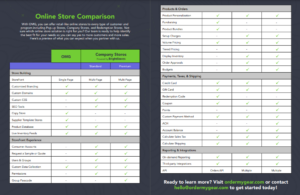
Contact Us & Get Started!
We love talking face to face with our customers, so schedule a one on one meeting with our team to find your perfect store solution here.

